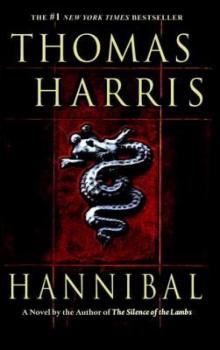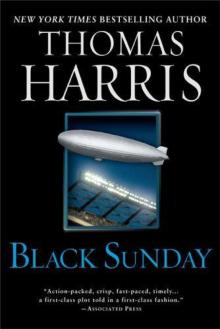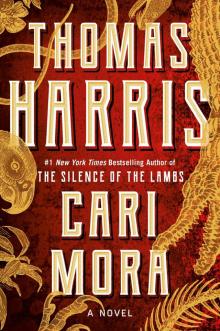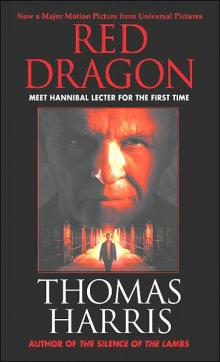- Home
- Thomas Harris
Cari Mora Page 5
Cari Mora Read online
Page 5
You are the air I breathe
And the light of the moon on the sea.
Clouds passed under the moon, painting the moving river in patches of soot and silver. For a moment the river looked easy to wade in.
Sparks flew upward from the fire.
Cari rose and kissed Antonio on the top of his head. He turned his face up to her just too late.
“I need to go home, Antonio Soltero,” she said.
Chapter Nine
Cari’s only family in Miami were her elderly aunt Jasmín, her cousin Julieta, and Julieta’s baby.
When Cari did not have a live-in job, she stayed with them in a housing project near Claude Pepper Way in Miami. Julieta’s husband had been seized by Immigration and Customs Enforcement when he went in voluntarily to register as instructed. He was in Krome Detention Center awaiting deportation for bouncing a check.
Like many Miamians who arrived in the U.S. on foot, Cari kept her business to herself. Only Marco and Antonio knew about her cousin, or where Julieta lived.
Late in the evening she let herself in the back door of the building with her key. Cari’s aunt and her cousin and the baby were asleep. She checked on Aunt Jasmín, bedridden, tiny and brown against the sheets. She looked at her aunt’s sleeping face. Jasmín’s eyes opened, pupils big and fathomless looking at Cari. Cari felt engulfed in her gaze. She could see in her aunt’s features vague resemblances to her mother’s face, as she sometimes saw familiar shapes in clouds. She felt that Jasmín was trying to tell her a secret, trying to recall something important to tell her, something only old people understood, though Cari knew very well there was nobody home in there.
Cari had the smell of the gun on her hands. She scrubbed them with lime juice and soap before she sat beside the sleeping baby, listening to her breathe. Cari had not smelled gun oil for a long time or tasted the copper taste of war, like a penny under her tongue…
At the age of eleven Cari had been taken from her village at gunpoint and conscripted into FARC, the Fuerzas Armadas Revolucionarias de Colombia.
FARC trained her as a soldier, and took her picture as a child soldier of the New Colombia. They jammed the regulation subdural contraceptive into her upper arm and used her in the ways that she was useful—she was quick and dexterous and strong. Cari was a child among children in the guerrilla base deep in the Caquetá forest.
They made it like a camp at first, for the little ones. The officers told the children they could go home in two weeks if they did not like the army. But truly they could never go home.
The children played together when they were not training. Many came from broken homes and were grateful for any attention. When the air raids stopped there was dancing in the camp at night. Sex among the teens was not frowned on, but marriage and pregnancy were forbidden. Abortion was mandatory. The officers told them they were married to the revolution.
Music and colored lights seemed magical to many of the little ones, coming as they did from remote villages.
And then, a month in, during a party in the trees at night, a couple tried to run away. They were thirteen years old and this was the second offense. The pickets caught them wading away in the shallows of the Caquetá River. The lookouts held them there in the flashlights and sent word to the camp. Everyone was assembled on the riverbank.
The comandante made a speech, lights flashing on his little round glasses. There had been a number of desertions recently and it had to stop. The two young people shivered in the beams of the flashlights, their legs trembling, their clothing wet, their hands tied behind them with white zip-tie strips. The girl’s clothing, wet and clinging, revealed a small baby bump. A bundle of food they had taken was on the ground beside them. Their hands bound, the boy and girl could not hold each other. They stood close and pressed the sides of their heads together.
The comandante said how wrong it was to desert. Should they be punished? “Judge them,” he said. “Should they be punished? They deserted you and they took your food. Hold up your hand if you think they should be punished.”
All the adults and most of the child soldiers thought yes, they should be punished. Cari held up her small hand with the others. Yes, they should be punished. Spanked perhaps? No breakfast even? Kitchen Patrol with Cari? The comandante signaled with his hand. The guards pushed the boy and girl into the shallows and shot them. The guards seemed hesitant to shoot at first. No one wanted to shoot first. The comandante barked. A shot, two, and then a lot of shots. The children went facedown, and rolled face up, and facedown again, blood in the water around them, and floated slowly away. One of the guards pushed the dead girl with his foot when her body stopped against a root. The ends of the white tie strips stuck out far from their small wrists. They floated away facedown, side by side, blood on the water like a scarf around them. Cari cried. Most of the children screamed and cried. They could hear the radio back at the camp still playing dance music.
How small the dead children’s wrists were. How far the ends of the tie strips stuck out from their small wrists. When Cari heard the word “horrible,” that is where her mind went.
Zip ties were everywhere, for a while they were the fashion for both the guerrillas and their enemies, the paramilitaries: a row of zip ties on a web belt ready to bind a prisoner. Zip ties do not rot and they shine whiter than the bones of skeletons on the jungle floor. Coming upon a corpse in the bush, it was not the rotting face that turned Cari’s stomach, or the buzzards flapping away, heavy from their meal. It was the bright zip tie that bound the wrists. The guerrillas trained with them—how to bind a prisoner using one hand to fasten the zip ties, how to shim a zip tie to escape, how to cut them with shoelaces. Bound wrists appeared a lot in Cari’s dreams.
Not tonight, not this night in Miami, in a chair beside the baby in her cousin’s home. She had seen from the window the zip tie cut from Benito’s wrists and seen the old man leave alive.
She did not think of other things. She listened to the baby breathing and drifted off to sleep.
Chapter Ten
Barranquilla, Colombia
Clínica Ángeles de la Misericordia, where Jesús Villarreal lay, is a hospital for the poor on a crowded market street. At midday a black Range Rover came to a stop in front of the hospital. The street crowd and vendors’ carts streamed around the car, vendors arguing and jostling for space.
Isidro Gomez, large and florid, got out of the front passenger seat. With nothing but the lift of his chin, he cleared space at the curb for the car. Gomez opened the rear door. His boss got out.
Don Ernesto Ibarra, forty-four, known to the tabloids as “Don Teflon,” is a man of medium height wearing a pressed linen bush jacket.
A number of patients in the hospital recognized Don Ernesto at once and called out his name as he and Gomez passed among them, through the stark ground-floor ward with its worn linoleum floor and the beds divided by screens.
Jesús Villarreal’s room was one of two private rooms at the end of the ward. Gomez went in without knocking. In a minute he came back out, rubbing his hands with an antiseptic wipe. He nodded to Don Ernesto, who went inside.
Jesús Villarreal lay in the bed, a withered old man, caught alive in the trap of rails and tubes around him. He tugged the oxygen mask away from his face.
“You were always careful, Don Ernesto,” Jesús Villarreal said. “You search the dying now? You send this enormous man to grope people in their beds?”
The Don smiled at him. “You shot at me in Cali.”
“It was just business, and you were shooting back,” Jesús said.
“I still regard you as a dangerous man, Jesús. Take it as a compliment. We can go forward in friendship.”
“You are an educator, Don Ernesto, an academic. You teach better ways to steal. But they don’t teach friendship at the school of Ten Bells.”
Don Ernesto considered Jesús, shrunken in the hospital bed. Looking at the old man, Don Ernesto tilted and turned his head as a crow might do ex
amining a berry on the ground.
“Your future is short, Jesús. You called me, and I came because I respect you. You were Pablo’s captain, you never sold him out, yet he left you nothing. Let us use the time you have and talk like men.”
The old man took a few breaths of oxygen from the mask to supplement the tube in his nose. He spoke in bursts.
“In 1989 I took gold to Miami for Pablo under ice in my trawler. A half ton of gold with fish on top—some groupers and a lot of sheepsheads. Thirty gold bars of the kind they call Good Delivery, four hundred troy ounces each, cast with numbers. Twenty-five kilo bars as well, the flat shape, but of doré gold from the mines at Inirida. And a big bag of tola bars of one hundred seventeen grams, I don’t know how many.” Jesús rested a minute, sucking air. “A thousand pounds of gold. I can tell you where it is. Do you know how much is worth a thousand pounds of gold?”
“About twenty-five million dollars U.S.”
“What will you give me?”
“What do you want?”
“Money and safety for Adriana and the boy.”
Don Ernesto nodded. “Claro. You know that my word is good.”
“Without offense, Don Ernesto, my policy is cash and carry.”
“With equal courtesy I ask you who else you have sold this information to other than Hans-Peter Schneider.”
“It is too late for us to play catch-me, fuck-me,” Jesús said. “He has found the vault that holds the gold. He cannot open it and stay alive unless I tell him how. Maybe Hans-Peter Schneider will try to move the whole thing to a remote place.”
“Can he move it and live?”
“Perhaps not.”
“Does it have a mercury switch? Will it blow up if it’s moved?”
Jesús Villarreal only pursed his lips. His lips were cracked and painful to purse.
“You can tell me how to open it,” Don Ernesto said.
“Yes. I will tell you now about some difficulties, and when you come with dinero efectivo in hand we will discuss how to solve them.”
Chapter Eleven
Dust from Africa carried on the wind colored the Miami dawn pink. On the far shore of Biscayne Bay, windows flared orange as the sun heaved out of the sea.
Hans-Peter Schneider and Felix stood on the patio of the Escobar house beside the hole in the lawn.
Umberto had made the hole bigger with a pick and a spade. From the dark below them came sucking noises. As the sea pulsed through the opening under the seawall and into the cave beneath them, the hole breathed out foul air. They turned their faces away from the stench.
Bobby Joe and Mateo brought some equipment out of the pool house.
A stacked echelon of pelicans passed over, heading for a fish drive.
“The fuck can I know what Jesús told Don Ernesto?” Schneider said. “We take it out the front, out the back, I could care less. What about the guy in Lauderdale?”
“Clyde Hopper, the engineer,” Felix said. “He’s got the equipment. He’ll meet us and work it out. He wants a meet at the boat.”
“Is his number on this telephone?” Hans-Peter said. He tapped his palm with the blue burner phone from the trunk of Felix’s car.
“What is that? I don’t know,” Felix said. He licked his lips.
“It’s the phone from the trunk of your car. Tell me the code to open the phone or Bobby Joe will blow your brains out.”
“Star six nine six nine. It’s just to talk to my girlfriend without the wife—you know.”
Hans-Peter pursed his lips as he poked the telephone and confirmed the code. He could explore the phone later.
“Okey-dokey,” Hans-Peter said. “Okey-dokey. Maybe we won’t need to pull it out, this fucking thing. Maybe we can crack it from the back. We’re going into the hole to look.”
“Who’s going into the hole?” Felix said.
Standing behind Felix were Bobby Joe and Mateo. Umberto was with them and he was holding a harness.
The line from the harness ran through a pulley on a big limb of the sea grape tree above the hole and on to a winch, a hand-cranked coffin hoist.
Bobby Joe held up the harness.
“Put it on,” Schneider told Felix.
“I didn’t sign up for this,” Felix said. “Anything happens to me you got trouble with my office.”
“You signed up for any fucking thing I tell you to do,” Schneider said. “You think you’re the only one in your office with their hand stuck out?”
Bobby Joe strapped Felix into the harness and hooked it to the line. Felix kissed a medal he wore around his neck.
Hans-Peter stood in front of Felix to have a pleasant little sip of Felix’s fear before the mask covered the man’s face.
It was a hazmat mask with two big charcoal filters on the cheeks, and headgear with a video camera and a miner’s light. Attached to his harness were a big flashlight and a large holster. Felix was wired for sound.
It was hard for him to suck enough air through the filters of the mask.
Birds passed across the sky, crows mobbing a hawk. Felix looked up and thought I love the sky. He had never thought about it before. His legs felt weak. “Give me a gun,” he said.
Bobby Joe put a big revolver in the holster and snapped the flap over it. “Don’t put your hand on the gun until you are under the ground,” he said.
They lowered Felix into the hole. The air belowground felt warm on his legs. He spun a little, hanging on the cable.
Once his head was below the grass it was hard to see. Daylight coming down through the hole reflected very little off the rough concrete of the seawall. Gloom became black darkness as the cave stretched away. The distance from the surface of the water to the ceiling varied from six feet to four feet as the water surged in the cave. When Felix was submerged to his waist, his feet found the bottom. The water swelled and fell from his hips to his chest and back again. The snaky roots of the sea grape came down through the ceiling. The roots were too stiff to push aside. Felix’s light bounced off the water and threw big shadows of the roots. He could see in patches the underside of the concrete patio and hanging dirt above him.
Hans-Peter Schneider watched on a laptop, Felix’s voice tinny on the speakers.
“The bottom’s pretty flat, I can walk. Water’s up to my chest. Shit—that’s half a dog!”
“You are doing just fine, Felix. Go look at the fucking cube,” Schneider said. “Do it now.”
Felix moved slowly toward the back of the cave. The pilings supporting the patio were around him like the pillars of a flooded temple. He was sweating. The light on his head reached the shelving beach and reflected off metal. His big flashlight revealed the beach was littered with bones, and a single human skull. The cube was big all right.
“It’s a box, taller than it is wide. Steel diamond plate, like a nonslip floor. Edges are welded.”
“How big?” Schneider said.
“Size of a refrigerator, bigger, like a deli refrigerator.”
“Any lifting rings? Handles?”
“I can’t see.”
“Well go up close and look at it.”
A fizzing sound behind Felix. He turned toward the sound. He saw concentric rows of small bubbles rising in a coffin shape.
Felix scrambled onto the beach.
“No handles, no lift rings, no door, no lid. I can’t see all of it, there’s dirt around some of it.”
A fizzing noise and Felix swung his light around. A pair of eyes reflected red in the dark water. He fired the pistol toward the eyes and they disappeared.
“I’m coming out, I’m coming out.” He waded fast to get back under the hole in the ceiling of the cave. “Pull me up! Pull me up.”
The winch was turning, the line was moving in front of him, the line was out of the water, dripping. The winch took up the slack and Felix was beginning to rise when a tremendous jerk moved him sideways and he went down in the water, the flashlight flying from his hand, the pistol fired into the ceiling.
> Up in the garden the winch spun backward, the handle whacking Bobby Joe on the hands and arms, whirring as the line paid out, the line slithering fast down the hole.
Down in the cave the line slithered out the hole under the seawall, came taut and sang, throwing drops of water. Then it fell limp to the floor of the cave.
“Crank him up!” Schneider yelled.
Watching the laptop, Schneider could see through Felix’s head camera the sea floor passing underneath him, the miner’s light beam bouncing along the bottom. Mateo and Umberto worked the winch, raising the harness.
It came out of the hole containing the lower half of Felix, his lower torso and legs draped with loops of pink and gray intestine.
In the distance, out on the bay, Felix’s hand broke the surface, cutting the water in something like a wave, until it was pulled down out of sight.
The men were quiet for a minute.
“That was my fucking pistol,” Bobby Joe said.
Umberto tried on Felix’s hat and his shades. “What about the house?” Umberto said.
Hans-Peter took the shades back from Umberto.
“A person in Felix’s office admires the glasses,” he said. “You can keep the hat.”
Chapter Twelve
Early in the morning Cari was grating carrots for the salsa picante Julieta sold at the farmers’ market.
The big white cockatoo muttered on its perch, annoyed by the crowing of roosters in the neighborhood.
“Chupa huevos,” the bird said.
Like Cari, Julieta was licensed as a home health aide—a handy skill now that her mother was housebound with no medical benefits.
They had furnished Julieta’s small apartment with oversize northern furniture given to them by families of elderly patients they had nursed to the end. Families of the sick liked the two young women very much; they were cheerful, strong enough to lift the patient, and they could look at anything without it showing on their faces. The furniture was comfortable but they had to climb around it in the small apartment.

 The Silence of the Lambs
The Silence of the Lambs Red Dragon
Red Dragon Hannibal
Hannibal Black Sunday
Black Sunday Cari Mora
Cari Mora Hannibal Rising
Hannibal Rising Red Dragon hl-1
Red Dragon hl-1 The Silence of the Lambs (Hannibal Lecter)
The Silence of the Lambs (Hannibal Lecter)